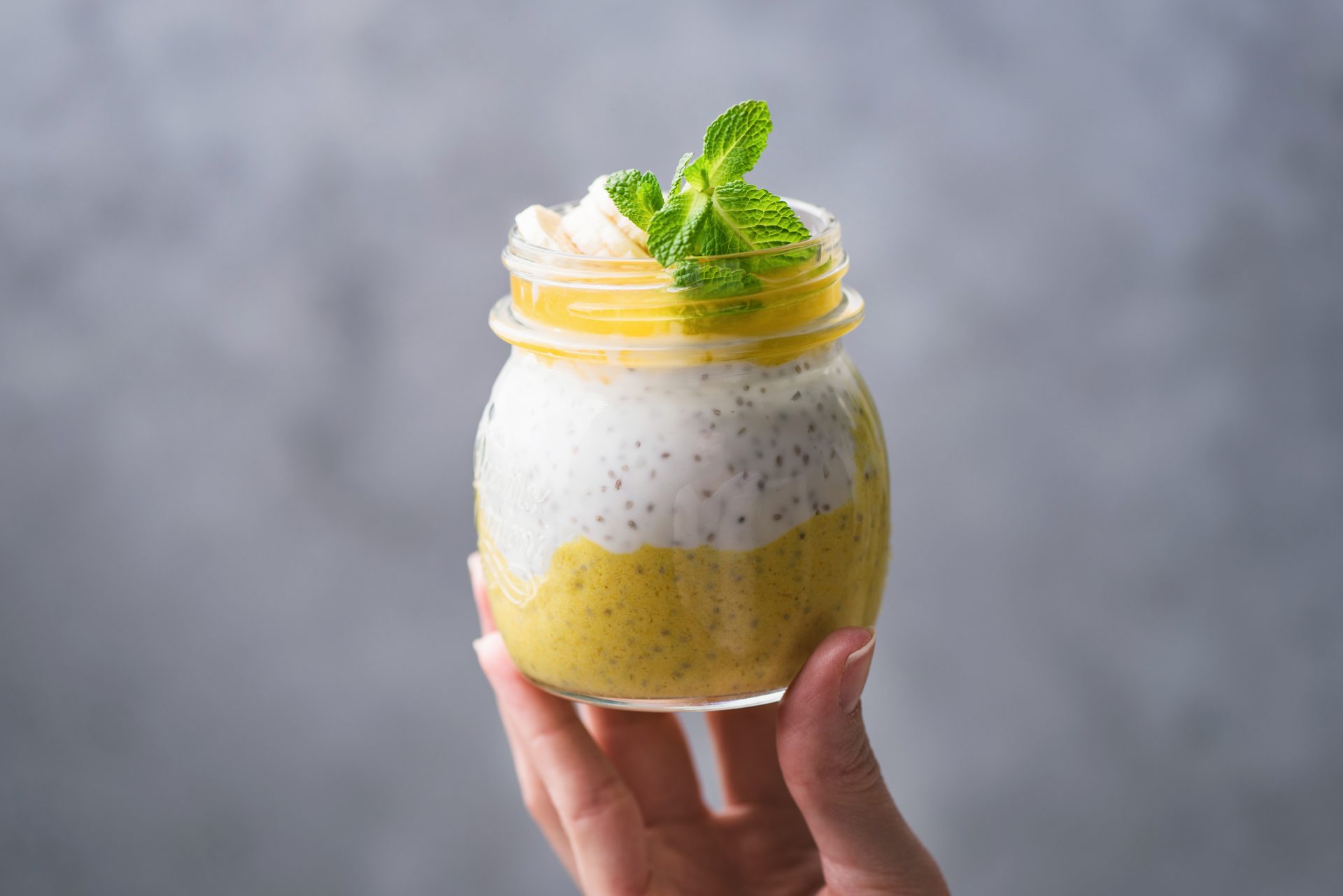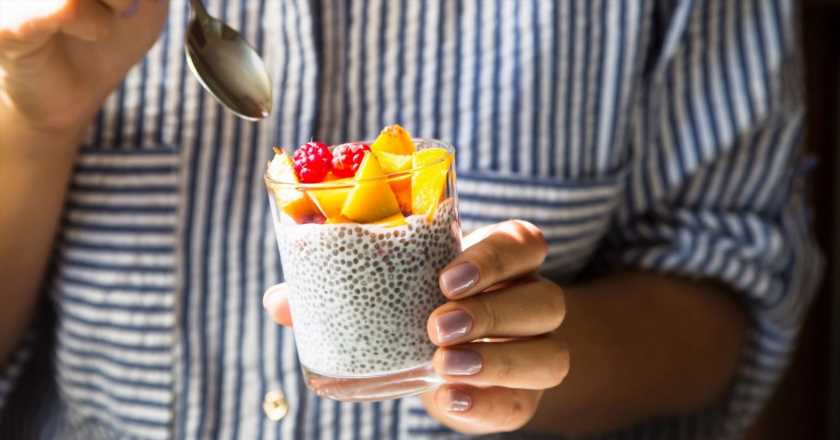Chia seeds are often hailed as something of a bowel superhero, but is a daily dose really enough to improve gut health? Or are they more hype than helpful?
At the risk of sharing too much information, my bowel habits have never been what you’d call ‘regular’. The slightest change in lifestyle – from drinking different water on holiday to sleeping later than usual on the weekends – plays havoc with my routine and regularity.
Added to this, I’ve suffered from medically diagnosed IBS for years, regularly feeling bloated and bunged up.
So, when I heard that eating chia pudding frequently is thought to improve digestive health and encourage more regular bowel habits, I thought it was worth a try. Could having a pot of chia pud every morning really improve my symptoms? I decided to give it a bash for a couple of weeks to find out.
You may also like
Gut health and bloating: are there any supplements to reduce bloating and inflammation?
What are the benefits of chia seeds?
You can’t go on social media without seeing pots of chia pudding prepared with some form of milk and topped with fruit, and the health benefits are pretty well known. From supporting blood sugar balance to promoting good cardiovascular health, they’re packed with vitamins, minerals and antioxidants. What I really want to know, though, is what they do to our gut.
“When soaked or ground, chia seeds contain approximately 30-35% (30-35g per 100g) fibre, which supports a healthy microbiome and frequent bowel motions,” explains Natalie Burrows, a nutritional therapist and functional medicine health coach.
“In addition, they’re rich in omega-3 fatty acids which supports a reduction of inflammation for the whole body. The gut, in particular, can become inflamed with stress, alcohol and disruption in the microbiome.”

How to make chia pudding
The title ‘pudding’ is something of a misnomer; it’s not really a typical dessert. I ate it for breakfast (increasingly, it appears on breakfast and brunch menus) but you certainly could have as a post-lunch or dinner dessert. It can be quite filling, though, so it makes more sense to have it as a meal in itself.
To be honest, I didn’t think I’d like it. Preparing the pudding at midnight the night before (it’s advisable to leave the seeds to soak for at least two hours, but preferably overnight) felt like a faff, but I was grateful the following morning when I only had to reach into my fridge and scatter some blueberries on top.
And you know what? It was delicious.
It’s important to follow a few steps when preparing the pudding, in order to gain maximum gut boost for your buck.
Be careful to soak the seeds first
“If you don’t soak chia seeds, you’ll mostly be getting insoluble fibre from them, which can actually make the stool harder and more bulky,” advises consultant dietitian Sophie Medlin. “This might be useful if you have diarrhoea, but it’s not ideal if you’re constipated.
“When you soak chia seeds in water or plant milk, they swell up and create a gel-like texture which helps to lubricate the bowel, making the passage of poo through the gut easier,” she continues. “The gel they create is also an excellent food for the probiotic bacteria in our colon.”
You may also like
Try this chia pudding recipe for pre-workout fuel
Choose your (plant) milk carefully
If you’re a non-dairy drinker, then it’s worth thinking about the type of plant milk you use. I soaked mine with unsweetened almond milk and a splash of maple syrup after discovering that some sweetened plant milks can disrupt the gut and microbiome. Go for unsweetened options and, if needed, add your own sweetener. For more protein-rich options, try soy or pea milks.
Watch your intake
Make sure you only use two tablespoons of chia seeds, which is one serving. Because they are so fibre-dense, consuming more than this could cause digestive discomfort. You’ll be surprised how much they expand.
Does eating chia pudding improve gut health?
The experiment got off to a bad start: I had a nasty bout of food poisoning for the first couple of days, which threw my system totally out of whack. But I persevered, and over the course of the first week, I didn’t notice much change in the frequency of my stools, but I did notice that they looked a lot healthier (exactly how they should look: a 3-4 on the famous Bristol stool chart) and were easier to pass.
So far, so good.
By week two, I’d settled into the routine of nightly prep and easy mornings, which was great. I did go through a lot of maple syrup, however, which is not only expensive but also made me wonder – given what I learned about sweetened plant milks – whether this was interfering in any way with the benefits of the seeds.
I’ll be totally honest: at the end of the two weeks, I felt as though my bowels were pretty similar to usual. There was no discernible difference. So why was this?
Why didn’t eating chia pudding affect me more?
According to the experts, there could be a few reasons that I didn’t notice a huge change. Firstly, my bowels are probably pretty healthy to begin with (having IBS doesn’t mean you have poor bowel health). And two weeks might not be long enough for my gut to improve significantly.
“It could have been that two weeks wasn’t long enough for you to notice an improvement,” explains Burrows. “It’s really difficult to tell when you’ll feel benefits as everyone’s starting point is different in terms of their gut health to begin with.
“It’s also important to remember that eating chia every day, while healthy for your gut, is just one aspect of gut health, and it won’t necessarily override other things you may be eating or doing that impact gut health too.”
So, while it may not have been the magic bullet I was hoping for, I’ll definitely continue to include chia pudding as part of my gut-healthy, balanced diet – just maybe not every day.
We’re increasingly learning about the importance of dietary diversity for good gut health, so while chia seeds are fantastically fibrous, eating them every single morning isn’t necessarily going to contribute to the diversity my microbes so desperately need. The key might be to consider chia as one of my 30 plants a week rather than a daily staple.
Two quick, gut-loving chia pudding recipes
Intrigued about chia? Try these very quick, easy recipes from Sophie Medlin.
Chia smoothie
- Pre-soak 1 dessert spoon of chia seeds in 150mls water for at least two hours.
- Blend 80g of fruit (such as frozen berries) with 150mls almond milk and one tablespoon of Greek/plant-based yoghurt.
- Pour the soaked chia into the blended fruit mix, stir and enjoy.
Chocolate chia dessert
- Soak 20g chia seeds in 250ml almond milk for at least 2 hours (preferably overnight).
- Stir in 1tsp cacao powder.
- Add a few drops of vanilla essence or paste.
- To serve, sprinkle over 1 dessert spoon of dried coconut, banana slices or any other fruit you like.
Images: Getty
Source: Read Full Article
